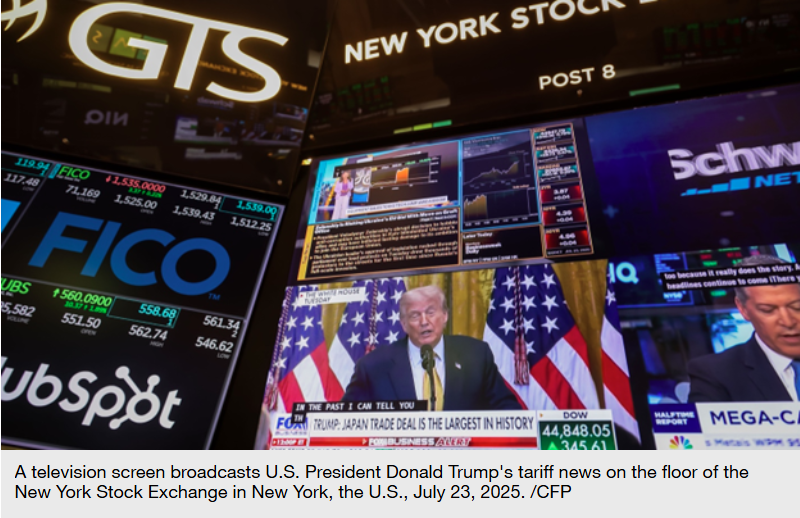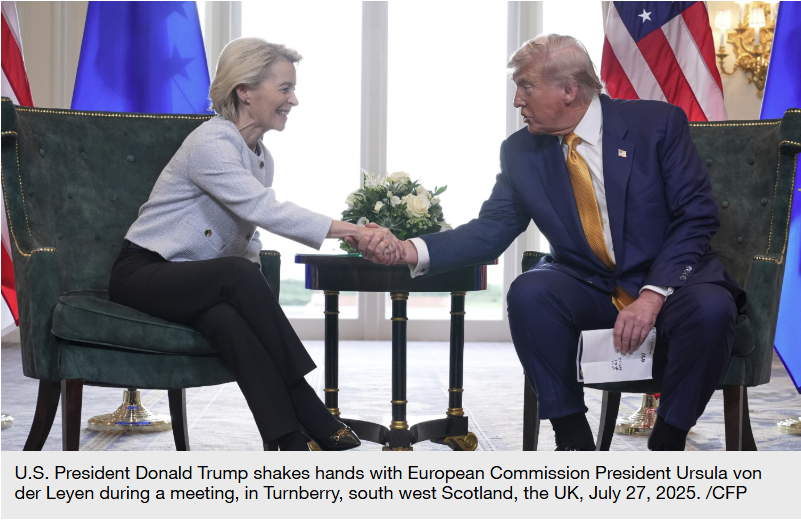LATEST INSIGHTS
Your Present Location: LATEST INSIGHTSRadhika Desai: Trump's Potemkin tariffs
Trump's Potemkin tariffs
Source:CGTN
Published Time: 2025-08-01 19:42

Editor's note: Radhika Desai, a special commentator for CGTN, is a professor of political studies at the University of Manitoba in Canada. The article reflects the author's opinions and not necessarily the views of CGTN.
U.S. President Trump's great tariff show has now reached another climax, of sorts. Countries without a trade agreement with his administration were expected to start paying draconian tariffs from August 1 but now that has been deferred to August 7. Is the world holding its breath during the run up to the latest tariff deadline? Maybe, but the stock markets were not.
The on again, off again tariffs saga of recent months led a Financial Times columnist to write that "Trump Always Chickens Out" (TACO), and the TACO trade has left the stock markets rising, serene in their conviction that this deadline too will pass largely inconsequentially.
Certainly, the outcome has been considerably less spectacular than advertised. Many of Washington's major trading partners – the EU, Japan, and the UK – made deals ahead of the deadline, Canada and Mexico have their U.S.-Mexico-Canada Agreement which Trump renegotiated in his previous stint at the White House, and a deal with China is being negotiated. Still, Trump has thrown the rest of the world economy, it would seem, "into a new era of mercantile competition."
This will undoubtedly devastate many small and vulnerable economies like Syria, Laos and Myanmar, which face the highest tariffs. Yet there is a distinct Potemkin air to the whole, far-from-concluded, tariff show, with Trump administration officials saying more deals could be announced in coming days.
Like the 18th century Russian Prince Potemkin erecting a facade of a prosperous village to hide rural poverty from Catherine the Great, Trump's tariffs are aimed chiefly to make Trump look like a powerful world leader and a president addressing the dire state of the U.S. economy. There is little substance behind either.
If Trump always chickens out, it is not because they will hurt his electoral base. They will but he cares little about them. He chickens out because they hurt his corporate cronies. No wonder the precipitously steep April 2 "Liberation Day" tariffs were halted as soon as stock markets dived. No wonder Trump repeatedly postponed most of them since and may yet chicken out of others. Moreover, the Potemkin character of Trump's tariffs is well demonstrated by the two most important trade deals Trump recently announced, with Japan and with the EU.
As is his wont, Trump hailed both with superlatives. The deal with Japan was "massive," "the largest deal ever made" and the one with the EU, "the biggest deal ever." But were they even deals? Unlike the typically voluminous and detailed trade deals, the result of months of negotiations among dozens of negotiators, these were reached after brief photo ops with no documentation backing them. Worse, the main headline items were soon disputed. Would Japan really invest $550 billion in the U.S. and hand over 90 percent of the profits to the U.S. government as the price for a lower U.S. tariff? Not according to Japanese officials. Does Trump care? Evidently not. No wonder some think that Japan had "walked away with a good deal at little cost" and set "an example … for other large exporters such as Germany and South Korea."

Though condemned by the leaders of Germany and France as capitulation, European Commission President Ursula von der Leyen's deal may have simply resorted to the easy expedient of making it appear to the narcissistic president that he had won, knowing that that is all that matters to him. Her promises to import $750 billion in energy from the U.S. over three years and to invest $600 billion in the U.S. are empty. Von der Leyen cannot bind member governments or private corporations.
For Trump, the theatrics of success matter most, not the tariffs. Since he won the election by telling voters, falsely, that their economic misery was caused by trade (and immigrants, when, in fact, it is caused by four and a half decades of bipartisan neoliberal policies), his overriding priority is to appear to be imposing tariffs. Such tariffs as he has managed to impose, and which are already causing distress around the world, can hardly improve the U.S. economy and the lot of U.S. workers. Had they been high enough, they may have shifted production to the U.S., but they are not. Had they been part of a proper industrial strategy, they may have played a role in re-industrializing the U.S., but they are not. Such a strategy would have required selective tariffs, not Trump's blanket tariffs, a steady approach, not Trump's chaos, and control over large corporations, not Trump's subservience to them.
So, a new chapter in the melodrama of Trump's tariffs begins. While other deals may be announced before the new August 7 deadline, Trump's recent flurry of trade "deals" have all been part of the ground-clearing for the mother of them all, the one with China. However, it is bound to end very differently, both in appearance and substance.
Since nothing is more important to Trump in his negotiations with China than to appear to be the victor, he is bound to lose on substance. The really bad news for him is, however, that he will not even win an apparent victory. China is in no mood for such theatrics. It knows it has the better hand – the U.S. is already less important to China than China is for the U.S.; and, ultimately, its rationally managed economy will prove resilient against the worst Trump can do – and it is ready to play it. And it has nothing to lose by refusing to make Trump look like a victor. No wonder negotiations in Stockholm find Trump already "chickening out with a new August 12 deadline.
Key Words: Tariffs























































































 京公网安备 11010802037854号
京公网安备 11010802037854号





